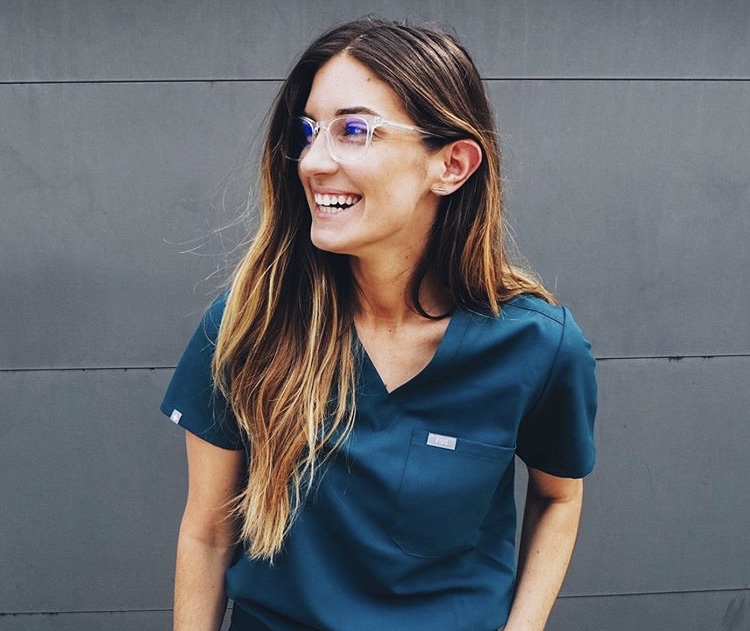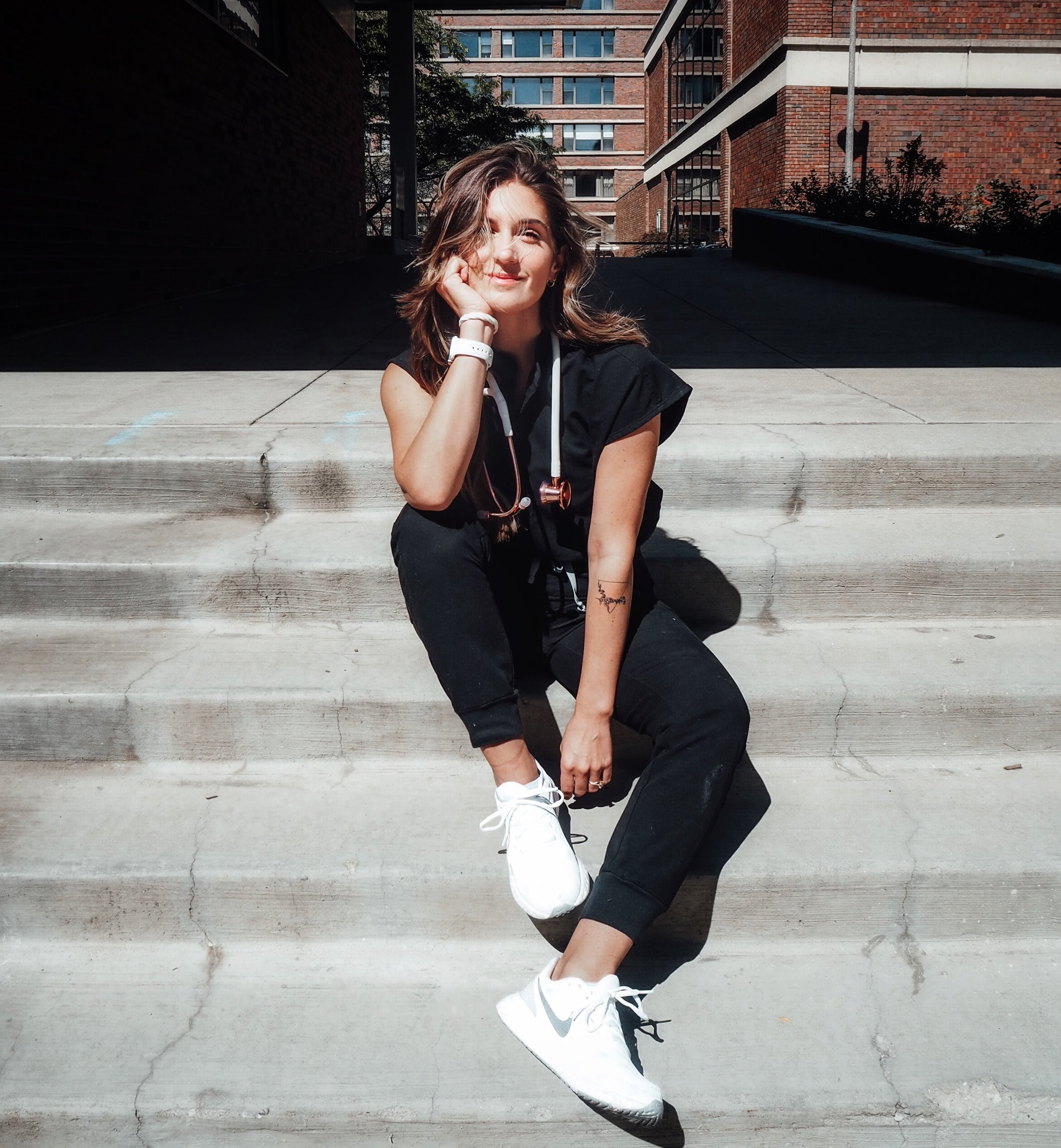Reflections from the Frontlines
/Reflections from the Frontlines
of the COVID-19 Pandemic
Hand sanitizer for 15 seconds.
Gown.
Booties.
Hand sanitizer again.
N95 mask and seal check.
Surgical mask, secured with bobby pins to keep it tight.
Hair net over my slicked back military bun.
Face shield.
First pair of gloves.
Second pair of gloves.
Ready.
This is the order I ritually put on my personal protective gear or PPE, the household term we are now all familiar with in 2020. Lack of supplies has not hit my institution as hard as others, however I have been asked to reuse my N95 mask over the course of multiple shifts. Sometimes I look down at my one N95 mask and remember how frequently we used to discard them. Before the COVID-19 pandemic and PPE shortage, discarding your N95 mask after every single use was considered best-practice. As I head in to see my first patient of the day, I pause. “Wait, did I forget my second hand sanitizer before touching my mask? No, I did it...I think...right? Well, here we go. Let’s do this”.
As you may know I am a clinical nursing instructor, family nurse practitioner doctoral student, and now a nurse working on the front-lines of the COVID-19 pandemic in Chicago. I am also IGrow Chicago’s resident nurse, “Nurse Jackie” as neighbors of our community call me. Right now the pandemic has brought me to an employee health COVID clinic where I perform the notorious nasopharyngeal swab for healthcare professionals. Described as anywhere from chlorinated pool water up your nose, to feeling like a stick is penetrating your brain, the coronavirus swab is anything but comfortable. I am testing employees, doctors and nurses who have performed the test on dozens of patients themselves.
In efforts to decrease transmission, patients are advised not to talk, though this guideline is rarely maintained. They are scared, uncertain and understandably in need of kind and compassionate words. Some patients shake, they cry or nervously ramble. Some are so anxious they uncontrollably laugh, in the way some displace emotions in a subconscious attempt to reduce anxiety. Many patients are healthcare workers I know. They are nurses that taught me how to start IVs. Nursing techs that have helped me monitor patients over 16 hour long shifts. Doctors I have rounded hospital halls with and have paged at 2AM about an unstable patient.
They are the health care professionals you now see in the newspaper, on TV and gracing billboards off the highway. They have been celebrated for their bravery and commitment to serving our community. They are mothers, fathers, sisters and brothers. They are friends. And they are now the patients. I am reminded every day how easily I too, can be the patient. Knowing my eyes are all they can see under my PPE, I look each person directly in the eye with my deepest empathy and compassion. I hope they can tell I am smiling, sending my love and trying my best to be there for them during this somewhat traumatic moment.
As the coronavirus pandemic sweeps the world, all eyes are on healthcare professionals and first responders in a way that could never have been anticipated. We are praised by loved ones and the media, but we are also uncertain. We are also scared. I have had my fair share of sleepless nights, panic attacks and have shed many, many tears. I wonder if today is the day my mask fails me and I am exposed. I wonder if today is the day I bring this disease home to my fiance who has stood by my side this entire time. Headlines of nurses dying of COVID in their own ICUs, doctors seeing devastating scenes of the coronavirus who took their own lives. I think about my twin sister working in an ICU, who is watching patients dying without a chance to say goodbye to loved ones. I pray she is given a clean mask today. The high-stake decisions and moral duress healthcare professionals currently face will undoubtedly take a toll on our field.
There are thousands out of work and unable to put dinner on the table. We are all facing unprecedented loneliness and lack of physical connection. This pandemic has hit Chicago’s vulnerable populations including the IGrow community in Englewood especially hard. They face barriers including food insecurity, lack of internet (meaning lack of updated information), jobs and/or housing where social distancing is not an option. This population in which trauma is no stranger, must rise against an inadequate healthcare system and decades worth of injustice, oppression, systemic racism and health disparities.
I feel my chest tightening, a lump in my throat and tears welling up in my eyes. I am frustrated, angry and scared. When my anxiety and fear seem to be taking over, I pause. Breathe. I look at the quote on my office table from Florence Nightingale, “The Lady with the Lamp,”. A social reformer, advocate and the founder of modern nursing,
“How very little can be done under the spirit of fear.”
Lithograph by Robert Riggs ca. 1930 with modern watercolor via The Independent
I refocus my energy and count my blessings. I have my health, a safe place to shelter, clean water, nourishing food, safe streets to walk down. I have my purpose: to serve my community and care for those most vulnerable. Succumbing to fear will not address the deep-rooted flaws in our healthcare systems or the disparities that are quite literally determining life and death in this pandemic. It will not change the 30-year difference in life expectancy that already exists between the Streeterville and Englewood neighborhoods of Chicago.
“How very little can be done under the spirit of fear”
During this time of crisis, we all see the way we can contribute, adapt, and take the lead. Whether you are on the frontlines, making masks, checking in on loved ones, supporting local or just staying home, you are part of something bigger than yourself. IGrow Chicago has donated thousands of meals, dozens of bars of soap, bottles of hand sanitizer and toilet paper. We are supporting children in remote learning, providing tutoring, legal benefits and financial support. Our medical volunteer team has expanded to four volunteer medical students and a fellow nurse. Together we make calls to over one hundred families to check on potential symptoms, mental health needs and share latest updates from the CDC regarding protection and safety. All families have my personal phone number to call or text with any questions or concerns.
At the end of my shift, I remove all PPE items in another specific order. I carefully take off my N95 mask, seeing it’s rough outlines on my skin as I place it in a safe and secure bag. I drive home from the clinic and begin my strict post-shift routine. Nothing with me or on me at the clinic enters the house. Work clothes and shoes are tossed into a pillowcase to be washed on the highest heat possible. After I disinfect the car and my essentials, I run to the shower. As the water streams down my face, my fears and anxieties also wash away. I have hope. I dream of the day I can once again hug neighbors at the most special place on 64th and Honore. The Peace House at IGrow Chicago, where love lives in public, where no life is expendable and where we always choose love.






















